

TED Talks. Gettier Problems. - The Washington Post. Why people believe the Earth is flat and we should listen to anti-vaxxers. Vikings: Warriors of No Nation. In January 2018, President Trump expressed a preference for immigrants from affluent nations such as Norway, as opposed to those from what he termed ‘shithole countries’.

The indignant response was on a global scale. Future - Should we drink milk to strengthen bones? How many of us were told as children to drink our milk because it would give us strong bones?
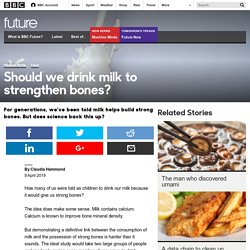
The idea does make some sense. Milk contains calcium. Calcium is known to improve bone mineral density. But demonstrating a definitive link between the consumption of milk and the possession of strong bones is harder than it sounds. The ideal study would take two large groups of people and randomly assign every member of one group to drink plenty of milk daily for several decades, while the other group would drink some kind of milk placebo instead. Brazil rejects U.N. appeal not to revise history by denying 1964 military coup. The very first image of a black hole, explained by 2 astrophysicists. This week, a group of scientists unveiled the first-ever image of a black hole at the center of the Messier 87 galaxy, some 55 million light-years away.
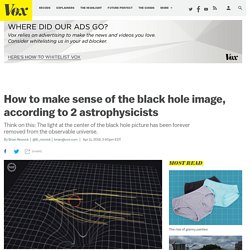
The image comes to us from a vast and incredibly sophisticated scientific collaboration called the Event Horizon Telescope, which involves 200 scientists in 20 countries who’ve been working together for nearly a decade. Oxford study finds digital screen time has little effect on teen mental health. Study Finds People With Autism Have Superior Hearing—It's a Blessing and a Curse. We often see in the media autistic savants who can write and play music like grand masters with incredible talent and flourish.
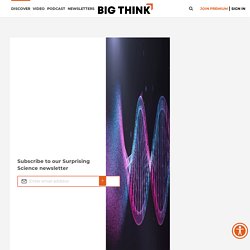
In fact, of autistic savants and savants in general, having extraordinary musical talent is one of the most common advantages. A new study published in the journal Cognition, suggests a reason for it. Those with autism spectrum disorder (ASD) have superior hearing. The Fears and Hopes of Universal Basic Income. We've mentioned the idea of Universal Basic Income, or universal income guarantee, here before at Big Think.
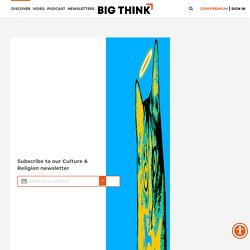
You might say that we enjoy mentioning it a lot. The idea goes back to the 1400s and has been taken up by many big thinkers throughout history, from Martin Luther and Martin Luther King to Thomas Moore and Milton Friedman. Walking Promotes Divergent Thinking, Find Stanford Scientists. Humans have a complicated relationship with walking. This wasn’t always so. British paleoanthropologist Mary Leakey identified marks of bipedalism dating back 3.7 million years in Tanzania—it’s an old endeavor indeed. How fake news gets into our minds, and what you can do to resist it. Although the term itself is not new, fake news presents a growing threat for societies across the world.

Only a small amount of fake news is needed to disrupt a conversation, and at extremes it can have an impact on democratic processes, including elections. Read more: We made deceptive robots to see why fake news spreads, and found a weakness But what can we do to avoid fake news, at a time when we could be waiting a while for mainstream media and social networks to step up and address the problem? From a psychology perspective, an important step in tackling fake news is to understand why it gets into our mind. What Is Intuition, And How Do We Use It? Using your Intuitive Compass...
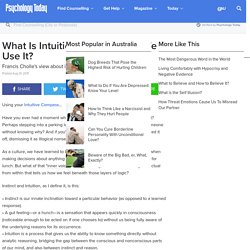
Have you ever had a moment where you felt as though something wasn't right? Perhaps stepping into a parking lot late at night, or feeling negative around someone without knowing why? How Frightened Should We Be of A.I.? Precisely how and when will our curiosity kill us?
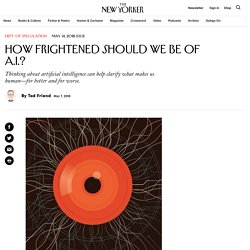
I bet you’re curious. A number of scientists and engineers fear that, once we build an artificial intelligence smarter than we are, a form of A.I. known as artificial general intelligence, doomsday may follow. The rise of robots: forget evil AI – the real risk is far more insidious. When we look at the rise of artificial intelligence, it’s easy to get carried away with dystopian visions of sentient machines that rebel against their human creators.
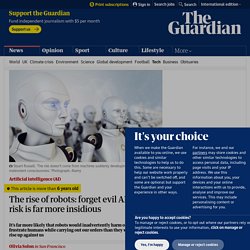
Fictional baddies such as the Terminator’s Skynet or Hal from 2001: A Space Odyssey have a lot to answer for. However, the real risk posed by AI – at least in the near term – is much more insidious. It’s far more likely that robots would inadvertently harm or frustrate humans while carrying out our orders than they would become conscious and rise up against us. In recognition of this, the University of California, Berkeley has this week launched a center to focus on building people-pleasing AIs. The Center for Human-Compatible Artificial Intelligence, launched this week with $5.5m in funding from the Open Philanthropy Project, is led by computer science professor and artificial intelligence pioneer Stuart Russell. We Spoke to an MIT Computer Scientists About the Simulation Hypothesis.
What if I told you that physical reality is an illusion and we all live in a computer simulation?
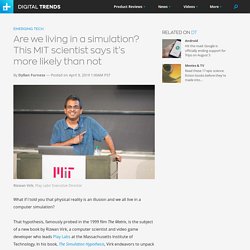
That hypothesis, famously probed in the 1999 film The Matrix, is the subject of a new book by Rizwan Virk, a computer scientist and video game developer who leads Play Labs at the Massachusetts Institute of Technology. In his book, The Simulation Hypothesis, Virk endeavors to unpack the heady arguments that call our physical world into question. Are we all just artificial intelligence (A.I.) programs running on the basement servers of some advanced future civilization? Intuition Is The Highest Form Of Intelligence. Guernica: Black and White and Red All Over.
The Mushroom Hunters: Neil Gaiman’s Feminist Poem About Science, Read by Amanda Palmer. The Big Question. Science and technology. Between Knowing and Believing - Alistair McGrath. Like everyone else, I long to know and embrace what is true and trustworthy. Yet as I get older, I have reluctantly come to the view that I know less and believe more – not because I have lapsed into some form of credulity, but rather because much of what I once thought was knowledge now seems to be opinion or belief.
It leaves us with the awkward question, which we need to confront honestly: how can we be sure that what we think we now know is not in fact simply a belief? And is the difference between them partly a matter of our location in the historical process? But let me return to the idyll of my intellectual youth. I was studying the natural sciences at high school, and had set my heart on going to Oxford to study chemistry – in my view, the most interesting and rewarding of the sciences.
Yet I also loved science because of its passionate quest for truth. Would you sacrifice one person to save five? - Eleanor Nelsen. Moral Machine. Utilitarianism - Ethics Unwrapped. Utilitarianism is an ethical theory that determines right from wrong by focusing on outcomes. It is a form of consequentialism. Utilitarianism holds that the most ethical choice is the one that will produce the greatest good for the greatest number.
It is the only moral framework that can be used to justify military force or war. It is also the most common approach to moral reasoning used in business because of the way in which it accounts for costs and benefits. However, because we cannot predict the future, it’s difficult to know with certainty whether the consequences of our actions will be good or bad. Utilitarianism also has trouble accounting for values such as justice and individual rights. How does ‘Hamilton,’ the non stop, hip-hop Broadway sensation tap rap’s master rhymes to blur musical lines? 24 Cognitive Biases stuffing up your thinking. Thou shalt not commit logical fallacies. Simple Explanation Of Hegelian Dialectic Method – A brood comb. Hegel For Beginners. Kqs get them right ib review. Philosophy and Addiction. The Cave: An Adaptation of Plato's Allegory in Clay.
Plato allegory cave 2018. Plato's Allegory of the Cave by TaraShaffer on DeviantArt. Banksy Has Unannounced Art Sale with Genuine Signed Canvases in Central Park, Sells Almost Nothing.